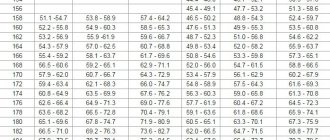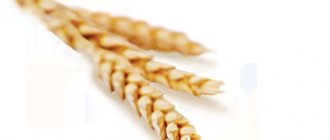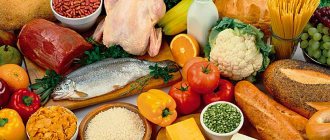The importance of carbohydrates for humans
Carbohydrates are the most important energy source for the human body. They may have a different number of structural units. The difference in structure leads to the division of carbohydrates into two types - simple and complex .
The first ones are easily digestible. This feature has led to the fact that they are also called “fast”. After entering the body with food, they increase the concentration of sugar in the blood. This mechanism of action entails a decrease in metabolic rate and an increase in fat deposits.
Unlike simple carbohydrates, complex carbohydrates are compounds of many saccharides, tens and hundreds of different elements. The energy contained in them is released gradually, providing long-term and stable saturation. This makes complex carbohydrates healthy .
They prolong life
Long-livers do not neglect carbohydrates. The regions where they are most abundant are called “blue zones,” which gives researchers the opportunity to accurately determine what foods people predominantly eat there.
One such region is the Japanese island of Okinawa. Japan generally has the largest number of centenarians over 100 years old. What are they eating? Lots of carbohydrates, especially sweet potatoes - by the way, until the 1950s, almost 70% of the local diet consisted of carbohydrates. They also consume a lot of green vegetables and legumes.
Another “blue zone” is the Greek island of Ikaria. About a third of its residents live comfortably to 90 years of age. Try to guess what they consume? Lots of bread, potatoes and legumes.
In the Blue Zones, carbohydrates are the main component of the diet . So you can be absolutely calm: their consumption prolongs your life and does not spoil your health in any way.
Why are simple carbohydrates harmful?
Fast carbohydrates, which have a high GI (glycemic index), undergo transformation into sugar in a few minutes, increasing its concentration. High blood glucose levels are dangerous. This leads to the body trying to neutralize this surge by any means.
The easiest way to utilize excess sugar is by converting it into body fat. The sharp fluctuation between the surge and fall of sugar leads to the fact that even after a sweet snack you feel hungry and want to eat again. A person begins to gain weight, but cannot give up sweets.
Why consider the glycemic index?
Often in the media, articles, magazines you can hear about such a thing as the glycemic index of foods. What it is and how GI is related to nutrients is not known to everyone. The glycemic index is a conditional indicator of the rate of breakdown of carbohydrates. The higher the GI, the faster the saccharide dissolves and is absorbed by the body in the form of glucose. Products with fast carbohydrates can be divided into two GI groups:
- From 40 GI units to 55. You should eat such food in moderation. If you are on a diet, it is better to give them up.
- Above 55. This category includes the most harmful foods that you should try to exclude from your diet.
Food products with a GI of up to 40 units are classified as complex saccharides. They break down gradually and do not enter the blood immediately. It is best to eat long-term carbohydrates every day; they improve the functioning of the brain, liver and cardiovascular system.
The glycemic index of foods must be taken into account for type 1 or type 2 diabetes. The permissible norm of saccharides is determined individually by the doctor in each specific case. You should also consult with a specialist about the list of products that should be present in the diet. Even if you do not suffer from this serious disease, you should treat yourself to simple carbohydrates very rarely. Systematic consumption of them in food puts a strong burden on the endocrine system, negatively affects the functioning of the pancreas, and slows down metabolic processes.

Complex carbohydrates
They are substances consisting of starch, cellulose - dietary fiber, glycogen - the main source of energy for muscle tissue. The composition of starch is represented by many molecules of the simplest carbohydrates. This is the reason for the long process of splitting this substance, which requires the expenditure of a large amount of energy.
Fiber not only has a truly complex structure, but it is also very diverse. Different plants have different types of fiber. Cellulose plays an important role in the process of normalizing digestion and blood glucose concentration, although it is only partially digested.
Harmful and healthy carbohydrates
The body benefits from complex carbohydrates of plant origin, which are subjected to moderate heat treatment. They are slightly inferior to whole grain cereals with an average GI index and a high content of dietary fiber.
Unshelled grains, which include white flour with rice, as well as products made from them, are neutral, but in large quantities they can lead to excess weight gain. The most harmful are simple carbohydrates, the amount of which should be limited.
Daily carbohydrate intake
The misconception about minimizing carbohydrate intake is caused by a lack of understanding of the difference between complex and simple carbohydrates. A person needs to consume from 250 to 400 grams of carbohydrates per day, that is, about 50-80 percent of the total calories.
Strength training requires an increase in carbohydrate intake. If the workout is moderate, for every kilogram of body weight there should be 5 grams, and when it is aimed at building muscle - about 7-8 grams.
Losing weight correctly: how to choose a diet or daily diet taking into account carbohydrate content
An ideal menu should include slow carbohydrates and, if possible, exclude fast ones.
To do this, it is not necessary to follow any special diet; the main thing is to study the lists of foods containing simple and complex carbohydrates and create your own table for weight loss.
When losing weight, carbohydrates should be under strict control
A number of factors should be taken into account:
- How active do you live?
- Your gender and age
- Presence or absence of special health requirements
- Do you play sports - and what kind?
- Is there an increased intellectual load in your life (study, responsible work, etc.)
All of this has a direct impact on how much and what kind of carbohydrates you should include in your menu.
Athletes, students and anyone whose professional activity is related to the intellectual sphere cannot do without fast carbohydrates.
But for those who lead a sedentary lifestyle, work in an office or engage in regular physical labor (this must be distinguished from physical activity in the gym and sports in general), it is better to prefer slow carbohydrates.
Tip: Remember the golden rule of balance. When adding or excluding certain substances from the menu, make sure that the diet remains complete, balanced and contains enough calories for a person of your age, gender and lifestyle.
Fiber is of great importance for health.

Your lifestyle also dictates a list of foods that you should give up and the quantity of which you need to increase.
Despite the fact that its nutritional value is practically zero, fiber is very important for the correct functioning of the digestive system, cleansing the body and optimal absorption of all nutrients from food.
Rich sources of dietary fiber include bran, legumes, vegetables, berries, dried fruits and a number of fresh fruits.
Before we start looking at each food category, it’s worth figuring out how to generally differentiate between simple and complex carbohydrates in food.
A list of foods indicating their carbohydrate content for weight loss will not always help: you need a table of the glycemic index of various dishes.
GI is an indicator of the rate of carbohydrate processing, and the higher it is, the more “fast” the foods are.
The most unhealthy foods have an index above seventy (one hundred is pure sugar), but the average GI (from forty to seventy) is not the best option for every day.
Products containing bran are rich in fiber
Simple carbohydrates: list of foods for weight loss
Fast carbohydrates are an instant boost of energy for both our body and brain.
Getting carried away with them in normal everyday life, you can quickly gain unwanted centimeters on your waist.
But there are also categories of people for whom simple carbohydrates, on the contrary, will help lose weight and stay healthy.
These include anyone who is actively involved in sports, as well as studying or engaged in heavy mental activity.
If you go to the gym, run, swim or exercise at home, remember that after a strenuous workout, muscles grow and strengthen, which means they need additional energy.
The same is true for active “thinkers”: our brain works primarily on glucose, and therefore the lack of recharge after mental stress can lead to stress and even a nervous breakdown.
Without prompt energy supply, the body literally begins to absorb itself, which results in disorders of physical and mental health.
Carbohydrates are essential after sports
That is why, after physical and intellectual stress, a portion of fast carbohydrates will be appropriate to replenish the body's resources.
Here is a list of high-carbohydrate foods that you can add to your weight loss chart:
- Fresh fruits: apricots, melons, bananas and pineapples
- Vegetables: potatoes in any form, pumpkin, corn
- Baked goods (it is better to choose wholemeal rye flour)
- Watermelons
- Dried fruits
- Nuts
- Rice
Baked goods made from wheat flour, all kinds of bars and chocolates, sweet drinks (especially carbonated ones), and chips are also characterized by a high GI.
It is not recommended to consume them: even after training, the body’s resources should be replenished with more healthy products.
“Harmful” sources of simple carbohydrates include muesli, which should be excluded from the list of foods in the weight loss table.
Don't forget about the benefits of dried fruits
Low-carbohydrate foods: list for weight loss
The extreme to which fans and admirers of various diets often go is a complete restriction on sweets.
However, it is important to understand that the keto diet, which limits carbohydrate intake, is quite complex.
You need to understand its principles, mechanisms of operation and contraindications in order to eat only foods without carbohydrates for weight loss.
This diet is indicated for athletes during “drying” of the body, as well as physically and mentally healthy people who want to quickly reduce the volume of subcutaneous fat.
Let us emphasize again: absolutely healthy!
The fact is that strictly limiting carbohydrates in the diet creates a serious burden on the body, forcing it to completely adapt to obtaining energy from lipids.
This is very effective for losing weight, however, it is also very dangerous if there are any disorders in the body that you may not even know about.
Advice: Before switching to carbohydrate-free weight loss products, consult your doctor. The examination will help determine whether you have any contraindications for following the keto diet.
Cheeses are included in the list of low-carb foods
Vegetables, cheeses, pecans, peanut butter - this is a general list of low-carb foods for weight loss.
Creating a complete vegetarian keto menu is quite difficult, since many sources of plant protein are excluded: starchy beans and corn. Bread and cereals are prohibited.
This diet is more suitable for short-term fasting and completing a weight loss program, rather than as the main means of losing weight.
When starting such a “grinding” diet, be sure to check the list of products for weight loss without carbohydrates, since even the slightest excess of 30 grams per day can disrupt the process and you will have to start over.
Complex carbohydrates: list of foods for weight loss
A diet based on slow carbohydrates is suitable for those who are not going to go to extremes.
The list of products to include in the weight loss table is extremely simple:
- Citrus
- Berries
- Pears, apples and apricots
- All vegetables except potatoes, pumpkin and corn
- Beans
- Lentils
- Pearl barley
- Peas
This base can be diluted with any low-carb vegetables, as well as suitable drinks: unsweetened tea, coffee, citrus and berry juices and clean still water.
A diet based on complex carbohydrates allows you to create a complete and balanced menu using this list of weight loss foods.
Source











